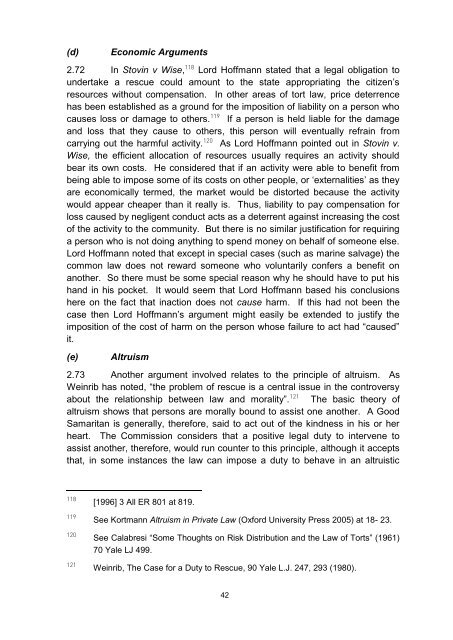civil liability of good samaritans and volunteers - Law Reform ...
civil liability of good samaritans and volunteers - Law Reform ...
civil liability of good samaritans and volunteers - Law Reform ...
You also want an ePaper? Increase the reach of your titles
YUMPU automatically turns print PDFs into web optimized ePapers that Google loves.
(d)Economic Arguments2.72 In Stovin v Wise, 118 Lord H<strong>of</strong>fmann stated that a legal obligation toundertake a rescue could amount to the state appropriating the citizen‟sresources without compensation. In other areas <strong>of</strong> tort law, price deterrencehas been established as a ground for the imposition <strong>of</strong> <strong>liability</strong> on a person whocauses loss or damage to others. 119 If a person is held liable for the damage<strong>and</strong> loss that they cause to others, this person will eventually refrain fromcarrying out the harmful activity. 120 As Lord H<strong>of</strong>fmann pointed out in Stovin v.Wise, the efficient allocation <strong>of</strong> resources usually requires an activity shouldbear its own costs. He considered that if an activity were able to benefit frombeing able to impose some <strong>of</strong> its costs on other people, or „externalities‟ as theyare economically termed, the market would be distorted because the activitywould appear cheaper than it really is. Thus, <strong>liability</strong> to pay compensation forloss caused by negligent conduct acts as a deterrent against increasing the cost<strong>of</strong> the activity to the community. But there is no similar justification for requiringa person who is not doing anything to spend money on behalf <strong>of</strong> someone else.Lord H<strong>of</strong>fmann noted that except in special cases (such as marine salvage) thecommon law does not reward someone who voluntarily confers a benefit onanother. So there must be some special reason why he should have to put hish<strong>and</strong> in his pocket. It would seem that Lord H<strong>of</strong>fmann based his conclusionshere on the fact that inaction does not cause harm. If this had not been thecase then Lord H<strong>of</strong>fmann‟s argument might easily be extended to justify theimposition <strong>of</strong> the cost <strong>of</strong> harm on the person whose failure to act had “caused”it.(e)Altruism2.73 Another argument involved relates to the principle <strong>of</strong> altruism. AsWeinrib has noted, “the problem <strong>of</strong> rescue is a central issue in the controversyabout the relationship between law <strong>and</strong> morality”. 121 The basic theory <strong>of</strong>altruism shows that persons are morally bound to assist one another. A GoodSamaritan is generally, therefore, said to act out <strong>of</strong> the kindness in his or herheart. The Commission considers that a positive legal duty to intervene toassist another, therefore, would run counter to this principle, although it acceptsthat, in some instances the law can impose a duty to behave in an altruistic118119120121[1996] 3 All ER 801 at 819.See Kortmann Altruism in Private <strong>Law</strong> (Oxford University Press 2005) at 18- 23.See Calabresi “Some Thoughts on Risk Distribution <strong>and</strong> the <strong>Law</strong> <strong>of</strong> Torts” (1961)70 Yale LJ 499.Weinrib, The Case for a Duty to Rescue, 90 Yale L.J. 247, 293 (1980).42
















